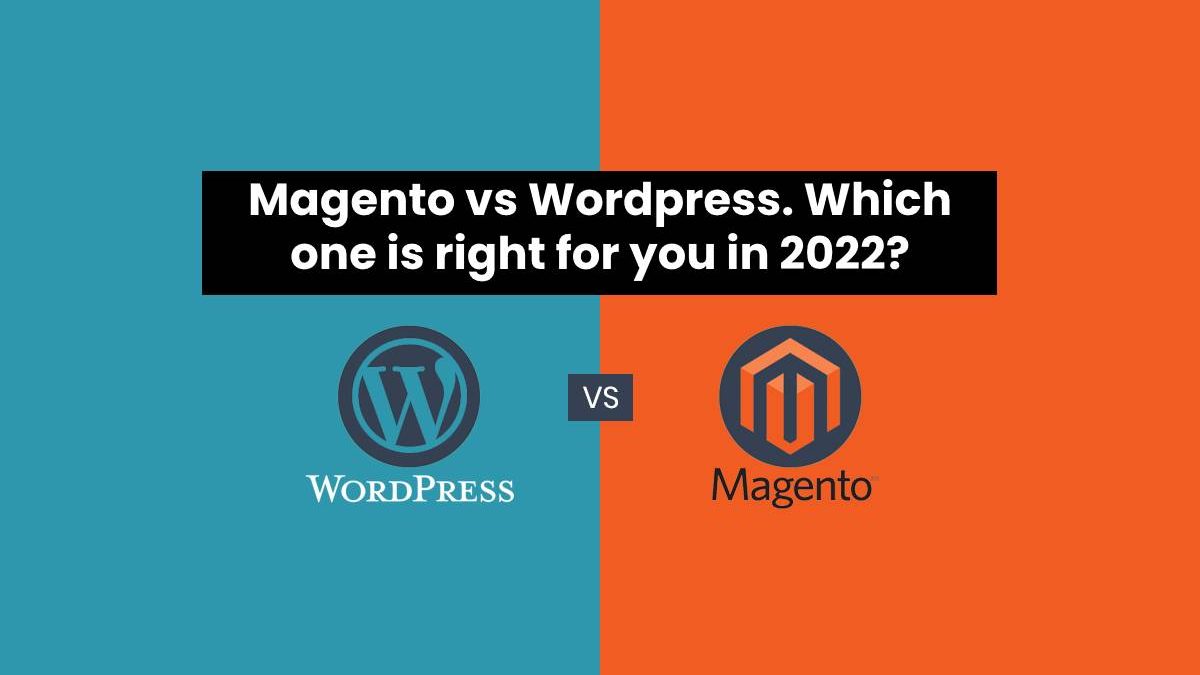With the widespread use of Magento and WordPress for building online eCommerce stores, it’s no wonder the question keeps being asked – Which one Is better?
Is it the easy and intuitive Woocommerce (WordPress)? Or the complex but functionality-packed Magento (with its paid version offering even more)?
The answer of course isn’t necessarily that one is better than the other but more so that both are suited for different types of projects.
In this article, we will explore the Pros and cons of each and put them head to head to see which one is the right one for your Business.
Table of Contents
WordPress
WordPress.org is a powerful CMS primarily designed for Blogging. Being open-source, the options to customize backend code is near limitless and there’s also a great community behind it; very much active and buzzing with helpful Programmers, designers, and engineers, all happily willing to chew on issues and challenges as a group.
To use E-Commerce with WordPress requires you to install WooCommerce, which requires an Online store Extension that is designed specifically for WordPress websites. Things such as a shopfront, a shopping cart with a check out, payment gateways (for example), and so on.
PROS
It’s Very flexible, with WordPress offering hundreds if not thousands of plugins at your disposal
Blogging is much more efficient and clean in WordPress.
As mentioned earlier, the online community is thriving, where people generously give their time and expertise to help other fellow users.
The backend of CMS & wordpress support and maintenance services are much easier to find out, which makes starting and modifying a website more accessible to most people.
Easy square wordpress integration for a smooth checkout.
WordPress gets updated quite regularly which means any site vulnerabilities are found and patched quickly
Converting your existing WordPress website into an eCommerce store is easy by using WooCommerce
WooCommerce is SEO-friendly as you can use the WordPress visual editor with it , allowing you to easily edit content , alt tags ,Meta descriptions and other page elements to raise your page’s ranking.
CONS
The most advanced features behind a paywall .
The quality of 3rd party Plugins vendors is often not monitored, which becomes a problem for people trying to buy the cheapest option from untrustworthy sources potentially leading to hackers accessing data.
Magento
Though Magento is also an open-source platform like WordPress, WordPress differs in the fact that it was initially developed specially for e-commerce to cater to the market. It is also a lot more technical and requires one to be familiar with coding to use effectively, especially in e-commerce. In other words, it’s more geared towards its web developers, having a steep learning curve for the average person.
The advantage here is that customization options far exceed anything WordPress can realistically offer. It is highly flexible and a skilled dev team could optimize the platform to the exact needs of whatever the project requires.
Pros
Scalable, from the smallest of startups to the largest of empires. You can make the platform suit the size and scope of your business.
Advanced features come bundled from the get-go requiring less effort snooping for the right plugin from other sources.
Mobile friendly from the get-go, which is important as 60% of internet users report using mobile phones for their online purchases.
The SEO functionality is very good having features like sitemap.xml , robot.txt file and multiple ways of redirecting pages
Magneto has a standardized ecosystem, which means – no shady 3rd party plugins or other unregulated options are added to the mix. This improves safety.
Premium options add a ton more features from offering a ton of inbuilt plugins , to cloud services to even licensing softwares from their parent company Adobe and even 24/7 Magento website support available .
Cons
You would need Technical help to use it. This means unless you are already a skilled coder or have one handy, using it as a sole entertainer or a very small business would make little sense
The Paid option is almost 24 grand a year, making it unaffordable for smaller ventures
The free community is unregulated on the whole, meaning the quality of information is not monitored strictly and may not provide reliable support all the time
The use of shared hosting can often cause laggy speeds, leading to many having to invest in a separate server or VPS
Which platform works better for your business?
In terms of selling a product or service, both platforms work very well. Successful companies are made using either the only caveat being perhaps that larger-scale operations tend to find more use for Magento due to its robust and more secure built, while businesses relying heavily on content marketing tend to find better utility in WordPress
To put it another way, some questions you can ask yourself are-
How many products does my shop contain
How heavy is my traffic going to be?
How quickly is my business going to scale?
How quickly do I need to start my venture?
Do I require massive amounts of content for the store?
Do I want a simple theme or a more elaborate one?
Answers that make it obvious that the business is
Large (over a 1000 products sold), Quickly scaling, Has heavy traffic from the get-go, Should go for Magento as it’s more suitable for here.
While businesses that have a smaller budget, need to quickly start and require lots of social media content (blogs, videos, articles) as their core strategy would find WordPress and Woocommerce to be a better fit.
When given an Option choose both
Honestly, if you so desire you could integrate both platforms for different areas of your site. Having a WordPress blog for your marketing content and Magento for your eCommerce platform is a solid way of incorporating both into your business. And with careful planning, this idea may be budget-friendly as well.
Summary
Magento and WooCommerce are both tried and tested Platforms. Each is popular in its own right and each gets the job done. Ultimately it’s up to you to find and test to see what your business strategy is and which tool you find most suitable to execute them.
Related posts
Sidebar
Recent Posts
The Best Forex Brokers for Beginners
Since COVID-19 first popped up, interest in the forex market has increased dramatically. Knowing how to get involved with minimal…
Maximizing Success: The Symbiosis of Dedicated Software Development Teams and Product Design Services
The Symbiosis of Dedicated Software Development Teams and Product Design Services In the rapidly evolving landscape of technology, businesses aiming…



